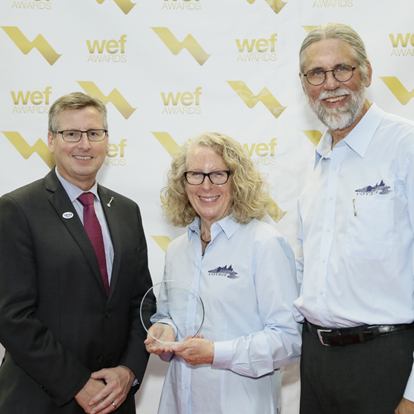World Water Corps®
The World Water Corps (WWC) is the technical volunteer arm of Water For People that supports our programs in their efforts to reach Everyone Forever. Everyone Forever is the cornerstone of Water For People's programming and success in the development sector. As simple as it may sound, Everyone Forever is highly complex and requires the full support of all stakeholders, including volunteers. WWC volunteers have the opportunity to engage with Water For People in a dynamic role as expert consultants committed to helping our programs solve technical challenges.
Water For People and the WWC do not dig wells or construct latrines. In fact, we don’t believe that contributing labor to a project is in the best interest of the community. Why? The answer is simple. Water For People is helping build local capacity and community strength that can last over time. We rely upon the WWC to help us learn and grow. Reports and feedback from the WWC volunteers help us understand what is working as we create (or adapt) our strategies in-country.
Historically, there have been several program areas – particularly monitoring, water quality and water resource management – where WWC has supported Water For People’s understanding and capacity.
With monitoring, we are excited to share that the monitoring function is now the full responsibility of country programs themselves. We are hoping to take this a step further and embed monitoring within the relevant national institutions, since this is a key piece of ensuring WASH services last Forever.
With water quality, we now have water safety plans in each country and are starting to monitor water quality as part of the annual reporting cycle. This ensures water quality is given appropriate emphasis within programming.
With water resource management, country programs are actively engaging in activities such as water resources inventories and management plans. Although this capacity is growing within our country programs, this is an area where we will continue to look to the WWC for support.
Moving forward, we will continue to identify opportunities where we can use the WWC, such as business planning and modeling, water resource management, and evaluations of specific program aspects. Most work will be completed as a desk study without international travel. We expect to have about five assignments per year, and will post each opportunity here as they develop.
Current WWC Assignments
Project Management Training (Africa)
Water For People and our partners fund largescale water infrastructure development in Malawi, Rwanda, and Uganda. These include pumped and gravity-fed piped schemes and boreholes - some of which cost more than USD 1 million per project. Managing these largescale projects brings with it significant financial, reputational, and technical challenges and risks. We use a combination of internal engineers and contract managers (including those employed by our partners) and externally contracted firms to supervise and manage the construction contracts. We have so far managed to do these well, but we believe that the increasing size and complexity of these projects exposes us to greater risks. We would like to manage these risks by upgrading our construction project management skills through a short-term training delivered by a highly experienced construction project manager.
Assignment Details
Deadline to Apply: Applications will be accepted until the right volunteers are chosen for the assignment.
ApplyOptimization of Fecal Sludge Briquette Production Process (Uganda)
Water For People Uganda has been actively involved in research and production of fecal sludge briquettes for over two years now. Fecal sludge briquettes started with setting up a DEFAST plant in the Kole District and engaging an entrepreneur to produce these as a reuse option within the sanitation value chain with the goal of developing a financially viable business. Following the successful setup of a briquette production plant in the Kole District, fecal sludge briquettes would be produced and supplied to Kampala, as the biggest fuel market in Uganda. With challenges in transportation and having indications of the market demand, it was further agreed to setup a briquette production plant in Kampala with hopes that the profits from the sales would subsidize pit emptying in Kampala.
The briquette production plant has been set up with both stick and honey comb briquettes totaling a production capacity of 2 tonnes per week. Initial tests were carried out on the briquettes for the optimal composition being 60% charcoal dust and 40% fecal sludge. With the increasing crackdown on deforestation in Uganda, we will soon run out of charcoal dust which is a big component of the briquettes hence the need to consider alternative sources of carbon to combine with the fecal sludge. There is also need to continue with research into optimization of the briquette production process understanding the timings and production volumes under different conditions and compositions.
Briquettes in Uganda are not a new idea, however Water For People is breaking new ground with the fecal sludge component and trying to develop it to scale under a strict timeline. For this assignment, Water For People is in need of 1-2 experts in production and optimization of briquette production.
Assignment Details
Deadline to Apply: Applications will be accepted until the right volunteers are chosen for the assignment, but our goal is to formally begin the assignment in mid-January 2019.
Apply
Additional Opportunities
The Community Engineering Corps® (CE Corps) combines the strengths of three allied organizations – American Water Works Association, American Society of Civil Engineers, and Engineers Without Borders USA – to assist underserved US communities in meeting their infrastructure needs and improving the quality of life for each of the communities’ members. Volunteers with a range of experience and expertise are needed to work on project teams, serve on committees or mentor student project teams. For more information, please visit www.communityengineeringcorps.org.





